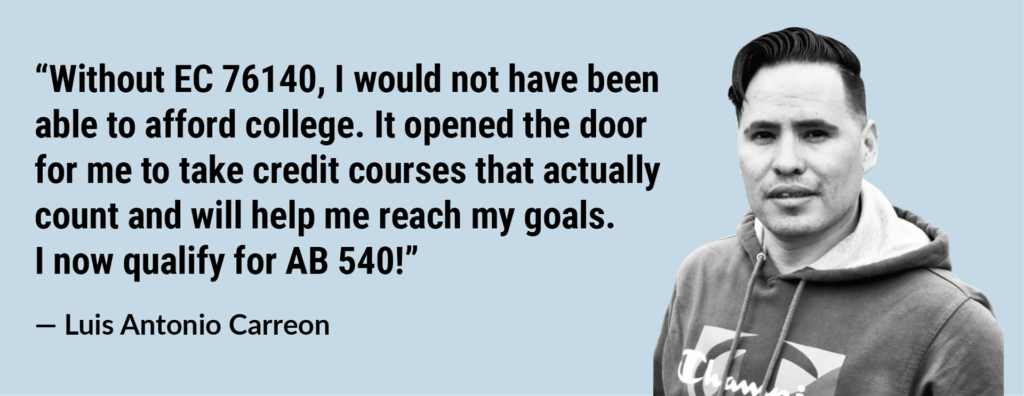Case Studies of Implementing EC 76140: Promising Practices from Hartnell College & San Mateo County Community College District
Themes/Topics: Higher Education
Geography: California
Audience: Educator
This resource is part of the Building Pathways to AB 540 resource series that discusses opportunities available for different educational institutions to build pathways for individuals who do not yet meet the eligibility for AB 540.
In May 2023, qualitative interviews were conducted at two California Community College (CCC) Districts that successfully implemented EC 76140. Interviews with key leaders and students from each campus supplemented the survey data collected in April 2023. Enrollment data and narratives were also collected during these interviews. These districts enacted all of the promising practices listed above, and we will highlight a few notable strategies to win BOT approval and make education more accessible for students after implementation.
San Mateo County Community College District
In 2022, with the coordinated efforts of a district-wide coalition, EC 76140 successfully passed at San Mateo County Community College District (SMCCCD), making it available to students at all three SMCCCD campuses: Cañada College, College of San Mateo, and Skyline College. “It took several years to win board approval, but a shared commitment to equity and access to education for all was the common purpose that drove the team,” says Dr. Wissem Bennani, Dean of Enrollment Services and Support Programs at Cañada College. SMCCCD first advocated for EC 76140 to the BOT in 2017. Unfortunately, they received significant pushback, and the policy failed. How did EC 76140 pass in 2022? Coalition advocate and Vice Chancellor of Education Services and Planning Aaron McVean stated it was the “right time to approach the BOT.” He credits the intentionality behind the board language, namely, the liberal interpretation of permissibility and the narrow interpretation of the student population that would benefit from EC 76140.
Notable Strategies From the SMCCCD
1. Build strong partnerships between undocumented student services and administrative allies.
Administrators from all campuses collaborated closely with, and not for, undocumented students and undocumented student services centers in gathering support for the adoption of EC 76140. SMCCCD’s District-wide Undocumented Student Support Coalition included the undocumented student centers from all three campuses and administrative allies. Lizette Bricker, Vice President of Enrollment Services & Support Programs, assisted with gathering the data. Aaron McVean took the lead in interpreting the education code, drafting the board policy, and presenting the proposal to the BOT. Dr. Bennani coordinated the implementation process once the policy was approved by BOT. The administrative allies collaborated hand in hand with undocumented student services staff and students, creating a safe space for students and staff to share the significant barriers students face in accessing affordable pathways to education. Building strong relationships between administrators and front-line staff empowers both groups to leverage their influence and expertise. Thus, they were able to jumpstart expanding equitable pathways for undocumented students to access higher education!
2. Effectively outreach to prospective students within the community.
Paola Mora Paredes, San Mateo Community College UndocuLiason, and Nimsi Garcia Sandoval, Cañada College Dream Center Program Services Coordinator, shared that they currently have 194 students enrolled in EC 76140 across all campuses—a testament to their effective outreach and active partnership with local community organizations, high schools, and adult schools.
3. Strategically braid programs and increase access to funding for undocumented students.
SMCCCD strategically packaged EC 76140 and Free College Fee Waiver Senate Bill 893 (SB 893)1 together for eligible students to increase access to both resources and eliminate tuition barriers and unit caps altogether. SB 893 passed on September 30, 2022, making community college free for low-income residents of San Mateo County, including undocumented students. In conjunction with SB 893, students eligible for EC 76140 may take up to 19 units free of charge, making SMCCCD one of the most progressive community college districts in California for nonresident students! Furthermore, EC 76140 allows students to take courses full-time, which was previously unavailable. EC 76140-eligible students ineligible for SB 893 may receive tuition support from the undocumented student center’s Dreamer Liaison Funds.
Hartnell College
Hartnell College is located in the heart of the Salinas Valley and is home to an agricultural community and a growing indigenous community. After witnessing the tuition barriers undocumented students who did not qualify for AB 540 faced, a coalition of key allies formed and mobilized to implement EC 76140 to address tuition barriers. This included community partnerships with the Migrant Education Program and ELAC and had strong interdepartmental collaboration consisting of the Dean of Enrollment Services, the Director of Student Affairs and Equity Program, the Undocumented Student Center, and other key administrative allies. After years of planning and organizing, the coalition presented data to the Board of Trustees highlighting the number of students who could benefit from this education code and the fiscal impact. Student testimonials were elevated and prioritized, providing insight into the student experience and credibility to the data presented. Through data-driven advocacy, on May 15th, 2018, EC 76140 was successfully approved and adopted by the Hartnell Community College District. As of Spring 2023, 37 students are currently enrolled in their program, and four have attained status through this program.
Notable Strategies from Hartnell College
1. Automate in-state tuition fees.
Through thoughtful implementation and keeping students’ access to EC 76140 in mind, Hartnell College accomplished the automation of In-State Tuition Fees and financial support for all. When nonresident students apply to Hartnell College and enroll in 6 units or less, they are automatically charged the CA state residency rate and do not have to complete a separate application to qualify for EC 76140 tuition fees. They also do not have to reapply for EC 76140 each semester, making the application process easy and accessible. However, students enrolled in 7 units or more are automatically charged nonresident fees. These students will receive a disclaimer that enrolling in more than six units will automatically be charged nonresident fees. Automating fees is a promising practice that all districts should consider if implementing EC 76140. Additionally, districts should consider adding a flag explaining EC 76140 and the potential nonresident fees.
2. Offer financial support to ALL students who cannot afford to pay their tuition fees.
Going the extra mile, Hartnell Community College offers financial support to ALL students eligible for EC 76140 who cannot afford to pay the resident tuition fees. Students who cannot afford their tuition fees obtained financial support from the Hartnell College Foundation employee giving campaign and AB 1645 funds. All students unable to pay these fees received financial support! As a result of this thoughtful implementation and outreach in the community, 37 students have been able to take courses continuously, five of whom have now qualified for AB 540.

Additional Resources
Sample proposals, presentations, and other resources from SMCCCD and Hartnell College:
- Allan Hancock College: Proposal, Presentation
- Hartnell College: Presentation
- San Mateo Community College District: Proposal, Presentation, 6 or Fewer Units, Nonresident Tuition Fee Waiver, Promotional Flyer, FAQ, Guide/Flowchart
Resources from CCCs that implemented EC 76140:
[1] The Free College Fee Waiver (SB 893) is an enrollment fee waiver that applies to students who reside in San Mateo County. Depending on financial need, students may also be exempted from paying the student body fee, student representation fee, student union fee, inclusive access fee(s), and materials fees associated with the course.
Acknowledgements
The Building Pathways to AB 540 resource series was co-created by Nancy Jodaitis and Gladys Puente Valentine, who collaborated on the research, writing, and envisioning. Gladys served as a community researcher with Immigrants Rising and formally was the Undocumented Student Coordinator at Sierra College. The layout and design is by Grace Yeo, with copyediting support from Keziah Aurin.
We’d like to thank Bronwyn Moreno, formally of Hartnell College, whose initial research kickstarted our efforts; Hilda Rivera, formally of North Orange Continuing Education, who elevated pathways from noncredit to credit programs; and the powerful team supporting undocumented students at San Mateo Community College District. We’d also like to thank all the innovative changemakers across the state who are actively building pathways toward AB 540 at CA Community Colleges, Adult Schools, and Noncredit programs.
Immigrants Rising helps you make decisions based on your potential, not your perceived limits. Visit our website so you can see what’s possible: immigrantsrising.org. Published 3/2024.
Back to Resources